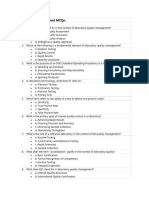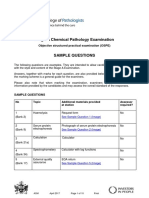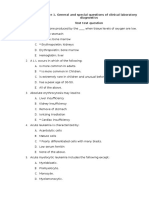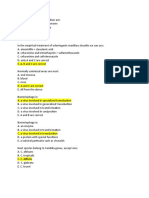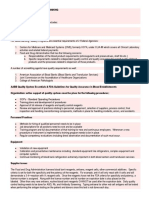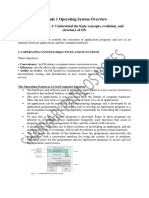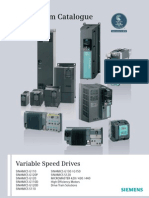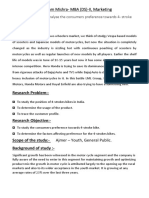75%(4)75% found this document useful (4 votes)
1K viewsMultiple Choice Questions
Multiple Choice Questions
Uploaded by
AneesUrRahmanThis document contains multiple choice questions about quality control and quality assurance in clinical laboratories. It covers topics such as definitions of quality control, types of errors, variables that affect test quality, quality assurance steps, purposes and contents of standard operating procedures, models of quality planning, process control factors, relationships between documents and records/information management, costs of quality including prevention and assurance, sources of errors, use of controls and standards, and the 11 quality system essentials.
Copyright:
© All Rights Reserved
Available Formats
Download as DOCX, PDF, TXT or read online from Scribd
Multiple Choice Questions
Multiple Choice Questions
Uploaded by
AneesUrRahman75%(4)75% found this document useful (4 votes)
1K views4 pagesThis document contains multiple choice questions about quality control and quality assurance in clinical laboratories. It covers topics such as definitions of quality control, types of errors, variables that affect test quality, quality assurance steps, purposes and contents of standard operating procedures, models of quality planning, process control factors, relationships between documents and records/information management, costs of quality including prevention and assurance, sources of errors, use of controls and standards, and the 11 quality system essentials.
Copyright
© © All Rights Reserved
Available Formats
DOCX, PDF, TXT or read online from Scribd
Share this document
Did you find this document useful?
Is this content inappropriate?
This document contains multiple choice questions about quality control and quality assurance in clinical laboratories. It covers topics such as definitions of quality control, types of errors, variables that affect test quality, quality assurance steps, purposes and contents of standard operating procedures, models of quality planning, process control factors, relationships between documents and records/information management, costs of quality including prevention and assurance, sources of errors, use of controls and standards, and the 11 quality system essentials.
Copyright:
© All Rights Reserved
Available Formats
Download as DOCX, PDF, TXT or read online from Scribd
Download as docx, pdf, or txt
75%(4)75% found this document useful (4 votes)
1K views4 pagesMultiple Choice Questions
Multiple Choice Questions
Uploaded by
AneesUrRahmanThis document contains multiple choice questions about quality control and quality assurance in clinical laboratories. It covers topics such as definitions of quality control, types of errors, variables that affect test quality, quality assurance steps, purposes and contents of standard operating procedures, models of quality planning, process control factors, relationships between documents and records/information management, costs of quality including prevention and assurance, sources of errors, use of controls and standards, and the 11 quality system essentials.
Copyright:
© All Rights Reserved
Available Formats
Download as DOCX, PDF, TXT or read online from Scribd
Download as docx, pdf, or txt
You are on page 1of 4
MULTIPLE CHOICE QUESTIONS
1. According to ISO ……. Definitions
Quality Control : A part of quality management system focused on fulfilling quality requirements.
a. 9000
9001
2001
None
1. Types of systemic errors:
Proportional (indicated by slope)
Constant (indicated by intercept)
Proportional + Constant (Combination of both)
All are true
QC programs ensure that the information generated by the laboratory is ….. , reliable, and
reproducible
a. Accurate
Inaccurate
Complete
None
1. Variables that affect the quality of results
a. Reagents
Equipment
The interpretation of the results
The transcription of results
All of the above
1. Quality assurance includes which step(S)?
a. Pre-analytical
Analytical
Post-analytical
All of the above
1. SOP’s are important in maintaining all EXCEPT
a. A high quality of service to patients.
They promote incompetent staff
Confidence in reliability of test results
By users of the laboratory
SOPs are also a valuable training tool
1. SOP needs to include the following EXCEPT
a. Principle of the TEST
Specimen condition
Reagents required
Price of the test
NONE of the above
1. Specimen collection step lies in which stage
a. Analytical stage
Pre-analytical stage
Post-analytical stage
None of the above
1. Which one is called the Model of Quality Planning?
a. Plan, Evaluate, Act, Improve
Plan, Act, Evaluate, Improve
Act, Plan, Evaluate, Improve
Evaluate, Improve, Act, Plan
1. Process control is comprised of several factors that ensures the quality of the laboratory testing
processes
a. Quality control
Management of the sample
Method verification and validation
All of the above
1. There is close relationship between "Documents and records" and "Information management".
a. Occurrence management
Information management
Facilities and safety
Purchasing and inventory
1. Cost of conformance include
a. Cost of assurance
Cost of prevention
Both A and B
None of these
1. Quality assurance provides confidence in the system that ensures…..of deliverables
a. Quality
Quantity
Range
Prices
1. Cost of prevention may include; Costs of Verifications ;
a. Checking of incoming material
processes
products
services to ensure that they conform to agreed specifications; Preventive Maintenance
All are true
1. Possible causes of Random errors are
a. Variation in pipettes and volumetric glassware
Variation in cuvettes
Variation in temperature
Variation in time control
None of the above
1. Electronic and optical variation in instruments are a type of which error?
a. Random error
Personal error
Systematic error
All of the above
1. Sources of error in sample collection includes all EXCEPT;
a. Improper patient identification
Wrong or incomplete labeling of specimen container
Use of proper equipment/tubes
Prolonged tourniquet application
1. Evaporation of serum water occurs because of
a. increase temperature
increase air exposure
increase specimen surface area
All are true
1. Standard are used for…..
a. Calibration
Checking if the method is out of control
Cleaning and washing the instrument
Both A and B
1. Internal quality control material includes ….
a. a patient-like material
not a patient like material
just a positive control
just a negative control
1. Which controls come with measuring system-specific values that are meant to be used as target
values for the laboratory using the controls?
a. Assayed controls
Un assayed controls
Blanks
Calibrators
1. Which error can occur in dealing a blood specimen
a. Contamination of plasma/serum with RBC,s
b. Centrifuging specimen requiring chilling at room temperature (ammonia,ACTH,Cortisol)
Repeated freezing , thawing & centrifuging
All can occur
1. Which controls have no assigned analyte values provided by the manufacturer
a. Assayed controls
Un assayed controls
Blanks
Calibrators
1. Random errors may be caused by which one of the following?
a. Variability in volume of sample or reagent delivered
Change of technologist doing the test
Low quality glassware being used
Increase workload
All are correct
1. The quality model used here organizes all of the laboratory activities into … Quality System
Essentials
a. 11
12
10
8
ATTEMP ALL QUESTIONS EACH CARRY 5 MARKS
1. What is Quality Control. What are the types of quality control.
Define are error and what errors can happen in a clinical laboratory.
What is Quality Essential Systems. Name and explain all the essentials.
What do you know about accuracy and precision?
What is Cost of Quality and explain its catagories briefly.
You might also like
- SIRE QUESTION and ANSWERS PREPARATIONS LISTDocument142 pagesSIRE QUESTION and ANSWERS PREPARATIONS LISTtroy morens100% (2)
- Omani Examination For Medical Laboratory Scientists Booklet: JANUARY 2023Document9 pagesOmani Examination For Medical Laboratory Scientists Booklet: JANUARY 2023modather sanosiNo ratings yet
- QC TestDocument5 pagesQC TestCleo Salvador100% (1)
- Laboratory Dha Praparation MCQ 1-2700Document263 pagesLaboratory Dha Praparation MCQ 1-2700Laal Shirt100% (2)
- Clinical Chemistry McqsDocument26 pagesClinical Chemistry McqsAhmed Aboamer100% (10)
- Chemical Pathology Questions For DiplomaDocument11 pagesChemical Pathology Questions For DiplomaSAMMY67% (3)
- Assessment of VA: 1. Breakdown 3 Ethical and Moral Values of A VADocument42 pagesAssessment of VA: 1. Breakdown 3 Ethical and Moral Values of A VAAneesUrRahman65% (23)
- VAM TOP Torque TableDocument25 pagesVAM TOP Torque TableRafael Silva75% (4)
- Clinical - Chemistry-Comprehensive-ExamDocument3 pagesClinical - Chemistry-Comprehensive-ExamErleDianne Rull Sibal100% (1)
- Calibration and Quality Control in The LaboratoryDocument15 pagesCalibration and Quality Control in The LaboratoryChrisarh NofuenteNo ratings yet
- A Study On The Effects of Varying Dormitory Layouts and Interiors in The Productivity of Students - Full PDFDocument57 pagesA Study On The Effects of Varying Dormitory Layouts and Interiors in The Productivity of Students - Full PDFEunice Vargas100% (1)
- General Question: Saudi Council Exams For Laboratory TechnologistDocument32 pagesGeneral Question: Saudi Council Exams For Laboratory TechnologistMaaryMeee RMT100% (5)
- Saudi Council ExaminationDocument15 pagesSaudi Council Examinationdedxdreamth95% (41)
- Study Group الملزمة الاولىDocument233 pagesStudy Group الملزمة الاولىMoustafa Magdy100% (2)
- MCQ On Quality ControlDocument3 pagesMCQ On Quality ControlGanesh83% (29)
- Clinical Chemistry Sle MCQDocument10 pagesClinical Chemistry Sle MCQAsif Newaz100% (1)
- Lab Quality ManagementDocument8 pagesLab Quality Managementmariam zameerNo ratings yet
- Acid Fast Stain MCQsDocument2 pagesAcid Fast Stain MCQsMahi Shafique100% (2)
- Serology 100 PT QuestionnaireDocument6 pagesSerology 100 PT QuestionnaireKate Camat FaminialagaoNo ratings yet
- Allied Health Council Examination QuestionsDocument39 pagesAllied Health Council Examination QuestionsSAMMY100% (2)
- Esic Lab Technician 2016Document65 pagesEsic Lab Technician 2016Narasimhulu Pidem100% (1)
- Chapter 3 - MCQs For Lab Technician and Technologist Exam Preparation - Lab Tests GuideDocument7 pagesChapter 3 - MCQs For Lab Technician and Technologist Exam Preparation - Lab Tests GuideEdwinLeo100% (1)
- MCQ MicroDocument4 pagesMCQ MicroBindu Verma80% (5)
- Chapter 8 Code of Ethical ConductDocument13 pagesChapter 8 Code of Ethical ConducttenawNo ratings yet
- MCQs For LaboratoryDocument42 pagesMCQs For Laboratorynarendrakumar94100% (2)
- What Is The Primary Goal of Laboratory Quality ManagementDocument4 pagesWhat Is The Primary Goal of Laboratory Quality Managementmariam zameer100% (1)
- Chapter 6 - MCQs For Lab Technician and Technologists - Lab Tests GuideDocument9 pagesChapter 6 - MCQs For Lab Technician and Technologists - Lab Tests GuideEdwinLeoNo ratings yet
- Chemical Pathology Stage A Examination Sample QuestionsDocument10 pagesChemical Pathology Stage A Examination Sample QuestionsHabib UllahNo ratings yet
- Lab Commodity MGTDocument44 pagesLab Commodity MGTMegbaruNo ratings yet
- Saudi Counsel Exams For LabDocument30 pagesSaudi Counsel Exams For Labasif87% (15)
- General QuestionDocument70 pagesGeneral QuestionMONFOLA100% (2)
- Serology Answer Sheet 100 Point ExamDocument5 pagesSerology Answer Sheet 100 Point ExamKate Camat Faminialagao100% (2)
- TQM MCQsDocument8 pagesTQM MCQsrattan billawaria100% (1)
- Haematology Mcq1Document9 pagesHaematology Mcq1Callum100% (2)
- MCQ - TQMDocument10 pagesMCQ - TQMTushar Tale100% (3)
- Pharmaceutical Analysis, MCQsDocument6 pagesPharmaceutical Analysis, MCQsDr. Aditi100% (1)
- Wuchereria Bancrofti: 1-Blood of Microfilaria Infection Diagnostic WithDocument7 pagesWuchereria Bancrofti: 1-Blood of Microfilaria Infection Diagnostic Withman3o0ol75% (4)
- Instrument Calibration Multiple Choice Questions Calibration MCQDocument2 pagesInstrument Calibration Multiple Choice Questions Calibration MCQVraja Kisori100% (3)
- أكثر من 250 سؤال مع الاجابة لاسئلة الهيئة السعودية للنخصصات الصحية لاخصائي ابحاث الدم والهيماتولDocument33 pagesأكثر من 250 سؤال مع الاجابة لاسئلة الهيئة السعودية للنخصصات الصحية لاخصائي ابحاث الدم والهيماتولMohsen HaleemNo ratings yet
- MCQ Weighing ScaleDocument2 pagesMCQ Weighing ScaleSara RezaNo ratings yet
- The 12 Essentials of Quality Management in Laboratory EnvironmentsDocument5 pagesThe 12 Essentials of Quality Management in Laboratory EnvironmentsKristine Randall D. Tandoc100% (6)
- MLT MCQDocument13 pagesMLT MCQRamesh Rangu88% (8)
- Lab TechnicianDocument5 pagesLab TechnicianPradip Hamal100% (4)
- MEDICAL LAB TECHNOLOGIST EXAM MCQS 2023, - Sarkari Results FastDocument12 pagesMEDICAL LAB TECHNOLOGIST EXAM MCQS 2023, - Sarkari Results FastSonu0% (1)
- MSQ Quality AssessmentDocument15 pagesMSQ Quality AssessmentMohsen HaleemNo ratings yet
- Distillation and DeionizerDocument26 pagesDistillation and Deionizerhamadadodo7No ratings yet
- Lab Technologist-3Document92 pagesLab Technologist-3AHAMED SHIFAAN100% (3)
- Engineering Metrology Questions and Answers - Metrology in Quality AssuranceDocument13 pagesEngineering Metrology Questions and Answers - Metrology in Quality AssuranceSaddaqatNo ratings yet
- MCQs For LaboratoryDocument42 pagesMCQs For LaboratorySami Khan87% (68)
- 29 Lab Tech. (MLT)Document17 pages29 Lab Tech. (MLT)Anjali JoshiNo ratings yet
- MCQ PDF 17 MicrobiologyDocument2 pagesMCQ PDF 17 Microbiologytarun chourhaNo ratings yet
- MCQs For Lab2 PDFDocument48 pagesMCQs For Lab2 PDFsalewaity100% (1)
- Module 1. General and Special Questions of Clinical Laboratory Diagnostics Text Test QuestionDocument229 pagesModule 1. General and Special Questions of Clinical Laboratory Diagnostics Text Test QuestionA.h.MuradNo ratings yet
- Micro MCQ W AnswersDocument41 pagesMicro MCQ W AnswersDiana Ioana100% (1)
- Aborashad 2010 - Edit by Bosha11-4Document96 pagesAborashad 2010 - Edit by Bosha11-4Osama Bakheet100% (1)
- Best Choice QuestionsDocument6 pagesBest Choice QuestionsSadia AbbasiNo ratings yet
- MCQs of RENAL FUNCTION TESTSDocument4 pagesMCQs of RENAL FUNCTION TESTSNOOR100% (7)
- Sparsh Gupta 14e-Anti Diabetes MCQDocument12 pagesSparsh Gupta 14e-Anti Diabetes MCQSubodh Chaudhari100% (2)
- Medical LaboratoryDocument34 pagesMedical Laboratorytsion07utNo ratings yet
- Hema 1 3 1Document16 pagesHema 1 3 1ninaalteres123100% (1)
- Quality Control Management in Labortory Services.Document54 pagesQuality Control Management in Labortory Services.Bakhtawar Siddique MemonNo ratings yet
- Reporter: Sanglad, Chariezza Lei J. Date Submitted: February 20, 2019 Topic: Introduction To Quality Assurance and Quality ControlDocument5 pagesReporter: Sanglad, Chariezza Lei J. Date Submitted: February 20, 2019 Topic: Introduction To Quality Assurance and Quality ControlYen BumNo ratings yet
- Analytical PhaseDocument5 pagesAnalytical PhaseScribdTranslationsNo ratings yet
- Quality Assurance in Blood BankingDocument3 pagesQuality Assurance in Blood BankingsobraGandaNo ratings yet
- Ahs 6 Pre Oprative and Instrument For VivaDocument3 pagesAhs 6 Pre Oprative and Instrument For VivaAneesUrRahmanNo ratings yet
- Ahs 6th Viva QuestionsDocument3 pagesAhs 6th Viva QuestionsAneesUrRahmanNo ratings yet
- (Roll No Slip) : Graduate Assessment Test (GAT General 2019-VI)Document1 page(Roll No Slip) : Graduate Assessment Test (GAT General 2019-VI)AneesUrRahmanNo ratings yet
- Synopsis Cross Sectional Study of Knowledge, Attitude and Practices Regarding Iron Deficiency Anemia in Educated People of Islamabad, PakistanDocument5 pagesSynopsis Cross Sectional Study of Knowledge, Attitude and Practices Regarding Iron Deficiency Anemia in Educated People of Islamabad, PakistanAneesUrRahmanNo ratings yet
- Questions-Class Activity 3Document3 pagesQuestions-Class Activity 3AneesUrRahmanNo ratings yet
- Frequency of N On-Adherence To Previous Treatment Among Relapse Tuberculosis PatientsDocument1 pageFrequency of N On-Adherence To Previous Treatment Among Relapse Tuberculosis PatientsAneesUrRahmanNo ratings yet
- Knowledge:: Knowledge Attitude and Practice Regarding Hypertension in General Population of IslamabadDocument2 pagesKnowledge:: Knowledge Attitude and Practice Regarding Hypertension in General Population of IslamabadAneesUrRahmanNo ratings yet
- "Frequency of Diabetes in Relapse TB: Bs Mltresearch Project Submitted By: Syeda Quratulain. 022-CMLT/BS-2015Document5 pages"Frequency of Diabetes in Relapse TB: Bs Mltresearch Project Submitted By: Syeda Quratulain. 022-CMLT/BS-2015AneesUrRahmanNo ratings yet
- Uploaded FileDocument30 pagesUploaded FileAneesUrRahman100% (1)
- Module 1 Operating System OverviewDocument20 pagesModule 1 Operating System OverviewJeet NakraniNo ratings yet
- Job Evaluation MethodsDocument5 pagesJob Evaluation MethodsSai KumarNo ratings yet
- Torque Communications: Seven Years of Great Thinking, Superb Execution The Past Decade Has Been Exciting, Challenging..Document7 pagesTorque Communications: Seven Years of Great Thinking, Superb Execution The Past Decade Has Been Exciting, Challenging..vinodNo ratings yet
- OISD STD-114 (2002) Hazardous Chemicals and Their HandlingDocument170 pagesOISD STD-114 (2002) Hazardous Chemicals and Their HandlingSatnam Singh Sadeora100% (4)
- Bct&a Unit-5Document25 pagesBct&a Unit-5munisrikar0511No ratings yet
- Install & Enable OpenSSH On CentOS 7Document7 pagesInstall & Enable OpenSSH On CentOS 7Ahmed chelsieNo ratings yet
- Week 3 Alds 2202Document13 pagesWeek 3 Alds 2202lauren michaelsNo ratings yet
- CatacikaDocument101 pagesCatacikadaperroNo ratings yet
- MSCFE 620 Group SubmissionDocument9 pagesMSCFE 620 Group SubmissionGauravNo ratings yet
- Experiences: 1. Saurav Auto Enterprises, Janakpur:: Deepak Kumar Singh (MBA - Finance)Document3 pagesExperiences: 1. Saurav Auto Enterprises, Janakpur:: Deepak Kumar Singh (MBA - Finance)Deepak SinghNo ratings yet
- CIVE1144 - Structural Analysis Lec 3 (2019)Document35 pagesCIVE1144 - Structural Analysis Lec 3 (2019)Leon TltNo ratings yet
- Inventory in Cookery Tools, Equipment and MaterialDocument5 pagesInventory in Cookery Tools, Equipment and MaterialGloriefe MeniosaNo ratings yet
- Preventive Maintenance System On DCP Equipment: Schools Division Office of PampangaDocument17 pagesPreventive Maintenance System On DCP Equipment: Schools Division Office of PampangaJoshua RamirezNo ratings yet
- Resumen de Accionamientos de Velocidad Variable SIEMENSDocument75 pagesResumen de Accionamientos de Velocidad Variable SIEMENSrjinjanNo ratings yet
- Children With Feeding Difficulties Tend To High Protein and Milk-BasedDocument9 pagesChildren With Feeding Difficulties Tend To High Protein and Milk-BasedCAMILA OSPINA AYALANo ratings yet
- Eos CVDocument2 pagesEos CVAlthea Louise PalacNo ratings yet
- Shubham Mishra Dissertation HandoutsDocument4 pagesShubham Mishra Dissertation Handoutsshubham mishraNo ratings yet
- AntiFraud & Defence SystemDocument230 pagesAntiFraud & Defence SystemJessica LangNo ratings yet
- Deutz 914lenDocument6 pagesDeutz 914lenYogesh JainNo ratings yet
- Core Fundamentals Activities V 11Document75 pagesCore Fundamentals Activities V 11thbull02No ratings yet
- Harper Medicaid PollDocument15 pagesHarper Medicaid PolljmicekNo ratings yet
- Hard HandoffDocument2 pagesHard HandoffSiddharth JainNo ratings yet
- Pricelistwef1 8 19Document141 pagesPricelistwef1 8 19JoelSamNo ratings yet
- Allah Nawaz Swot AnalysisDocument11 pagesAllah Nawaz Swot Analysisnawaz007No ratings yet
- Agrani First PartDocument5 pagesAgrani First Partmd. Piar AhamedNo ratings yet
- 2016 - Optimal Cycle-Length Formulas For Intersections With or Without Transit Signal Priority. BartDocument14 pages2016 - Optimal Cycle-Length Formulas For Intersections With or Without Transit Signal Priority. BartWILMAR PEÑANo ratings yet
- Question Paper Code: X: Reg. No.Document2 pagesQuestion Paper Code: X: Reg. No.Balasundaram SakthivelNo ratings yet
















